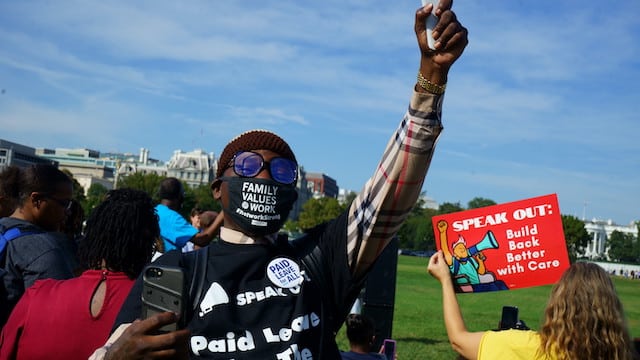Sandwich Maker Gets Fired After Calling In Sick, Then Joins A Crusade

For three years, Ian Rizzio, 24, had been working for a Portland sandwich shop to put himself through school. He was the manager — working 25 to 35 hours a week, earning $9.50 an hour — when one day he woke up feeling sick. He went into work, but ended up vomiting in the bathroom. Knowing that he couldn’t serve food under the state’s health code, he waited in his car for two hours, trying to reach his boss, and leaving messages. Finally he says he went home to rest.
When Rizzio came to the shop the next day, he says that his boss fired him on the spot. Like almost everywhere in the U.S. today, it was then legal in Portland for an employer to fire someone for calling in sick. “With over $35,000 in student loans, it was a do-or-die situation,” Rizzio told AOL Jobs. He thought that he might have to withdraw from school, where he was studying to be a mechanical engineer.
Luckily, Rizzio managed to find a new job the next day, as a prep cook. But when the advocacy group Working America knocked on his door soon after, and asked if he wanted to get involved in their sick-day campaign, Rizzio gave an enthusiastic yes. And on Wednesday, after Rizzio and others testified before the Portland City Council, it voted unanimously to approve a law requiring private employers to offer paid sick leave It became the fourth city in the U.S. to adopt such a bill; on Thursday, Philadelphia’s City Council passed a similar bill, but it failed to get enough votes to overcome the mayor’s likely veto.
“Me and my fiancee both work in the food industry, as do many of my close relatives and close friends,” explains Rizzio, who helped collect signatures supporting Portland’s sick day bill. “It was an issue that hit really close to home.”
According to the advocacy group Restaurant Opportunities Center United, almost 90 percent of restaurant workers don’t have paid sick leave. Overall, about 40 percent of American workers have no paid sick leave, according to the Bureau of Labor Statistics. In a 2011 survey, the Center for Disease Control found that 12 percent of food service workers had vomited or had diarrhea on two or more shifts in the past year. Under Portland’s new law, businesses with at least six employees must grant their workers an hour of sick leave for every 30 hours they work — up to 40 hours a year.
The fight for paid sick days has been an uphill battle. Republicans quashed a 2009 bill that would have mandated sick leave nationwide for businesses with at least 15 employees, so movement on the issue has been local. Since 2007, San Francisco, Washington, D.C., Seattle, the state of Connecticut, and now Portland have mandated paid sick leave.
But the issue has gained momentum in the last few months, with advocacy groups, like the Restaurant Opportunities Center United, campaigning aggressively for new laws. Earlier this month, Maryland lawmakers proposed their own version of the law, and on Friday, New York City will have a public hearing on its own paid sick leave bill. Even feminist icon Gloria Steinem has spoken out on the subject, saying that she won’t support New York City Council Speaker Christine Quinn unless she reverses her opposition to the bill.
Sick leave proposals tend to face strong resistance from business. Quinn has said that she supports the goal of paid sick leave, but that “with the current state of the economy and so many businesses struggling to stay alive, I do not believe it would be wise to implement this policy, in this way, at this time.”
“It’s the same arguments that business leaders always have,” explains Rizzio about the opposition he faced in his hometown. “It’s going to cost more money. It’s going to be less efficient. They’re going to move business out of Portland.”
Research has not backed up these fears though. The nonprofit research group the Institute for Women’s Policy Research conducted a cost-benefit analysis of sick leave laws almost everywhere they come to a vote. Their results are always the same: The estimated cost of paid sick leave (around 19 cents per hour per employee) is significantly outweighed by the savings due to reduced turnover and increased productivity. The institute also calculated significant savings for the government in terms of fewer emergency room visits, fewer nursing home stays, and more limited virus outbreaks.
A study published last year analyzing the flu pandemic of 2009 found that a lack of paid sick leave contributed to an estimated 6.2 million cases.
Opposition, however, is sizable and steadfast. In 2011, Denver voted down a paid leave bill almost 2 to 1, and Wisconsin Gov. Scott Walker banned any locality from passing paid sick leave regulations, nullifying the law that Milwaukee passed in 2008. And last September, the board of commissioners in Orange County, Fla., knocked paid sick leave off the upcoming ballot, despite 50,000 citizen signatures in support of it. It later emerged that the board had been in close contact with lobbyists for The Walt Disney Company, operators of the Walt Disney World Resort, and for Darden Restaurants, which owns Red Lobster and Olive Garden.
For people who lack paid sick leave and hope to follow Portland’s example, Rizzio has one piece of advice: “Organize.”